While we have all heard of companies roping in celebrities— actors, sportspersons, and now influencers— to promote their products or services, what about founders taking over as the face of their brands? Well, Mahashian Di Hatti, or MDH, did that, and phenomenally so, with its founder and ‘spice king’ Mahashay Dharampal Gulati becoming synonymous with the brand. Mumbai-based health food company The Whole Truth (TWT) has apparently adopted a similar strategy, putting its founder Shashank Mehta in all of its marketing campaigns and changing the way products are advertised and marketed.
“The Whole Truth has a strong, clear purpose, which is to rebuild the world’s trust in food. And we have a lot to say, about who broke this trust (big-food), how they broke it (by selling half-truths), and what it’ll take to rebuild it (The Whole Truth). So we don’t need some hired star or influencer to say it. Plus, the founder saying it signals confidence in our promise— if we don’t live up to it—you know who to catch,” Mehta tells FE.
Offering “100% clean-label” options, the company sells healthy packaged foods, from chocolates and energy bars to dark chocolates, nut butter, and muesli. While several FMCG companies sell these, many have recently come under fire over what can be termed as deceptive marketing, selling products in the garb of them being healthy, while instead containing ingredients that are harmful to the health such as sugar, sugar substitutes, palm oil, etc. A case in point is Cadbury’s Bournvita, which had to slash the sugar content in its ‘health drink’ by 14.4% after a social media outrage led by health influencer Revant Himatsingka.
“We are a 100% clean label—food so clean we can declare each and every ingredient, proudly, on the front of the pack,” Mehta says.
From its energy bars, and fudge to dark chocolates, The Whole Truth products taste good, but what works well is the trust the brand is building not only by declaring every ingredient on the front of the pack but also by its larger marketing strategy in which the company busts myths around packaged foods and how food marketing is traditionally done, which makes it deceptive, to general health queries that everybody Googles.
In one of the earliest campaigns, the company, in a dramatised fashion went heavy after influencer marketing, a quirky take on how influencers would promote products without trying them. In another, the company highlights the importance of reading food labels, so that one isn’t fooled by the name of an oat cookie that has more wheat and sugar than oats.
The firm’s social media is done in-house. “Campaigns like The Whole Truth of influencer marketing are done in collaboration with writers like Gursimran Khamba—but the idea still comes from us. It is as I said— the more the food industry lies, the more unique ways they give us to tell the truth,” Mehta says. “We have so much to say about this that ideas are never a problem, budgets are,” he quips.
Under, what it calls, The Whole Truth Academy, Mehta speaks about common health questions everyone is interested in getting answers to—how to improve gut health, tips for weight loss, soda vs diet soda—which one is better? Such videos are more educational and not promotional, with no product placement, but work well when it comes to increasing discoverability and increasing trust in the brand.
“Actually, we rarely talk about our products on our content channels. For example, The Whole Truth Academy is purely about education. We don’t make bread, or eggs, or cooking oils, but we help you choose right. We truly believe that if consumers learn how to read labels and judge good food from bad, they will pick us. And we see content as a form of service—we don’t hope to gain any sales from it. Just trust,” Mehta says.
While how much of the company’s unique marketing strategy has translated into sales is hard to determine, the company clocked a 125% rise in operating revenue to Rs 36 crore in FY23, as per media reports. “We expect to be a Rs 200-crore ARR company by the end of FY25,” comments Mehta.
The sales are largely through online channels so much so that “80% of our sales are still online, across quick commerce, marketplaces like Amazon, and our own website. Offline is still nascent for us. But we intend to grow it aggressively now,” he says.
Speaking on the segment on whether demand for clean-label food products has grown and an average consumer has become more vigilant, The Whole Truth founder answers in the affirmative. “Yes, consumers are definitely reading labels a lot more now. And hence a lot of brands are beginning to speak that language. But brands need to understand that they can’t do this half-heartedly. Consumers (and a few good influencers) are very smart. You can’t greenwash your way into their homes. They will see through your marketing,” he says.
And on his company’s marketing strategy, the founder highlights that the “brand started because of the blog I used to write. Consumer education is in our veins. We don’t see it as marketing. Content is our way of giving back.”
